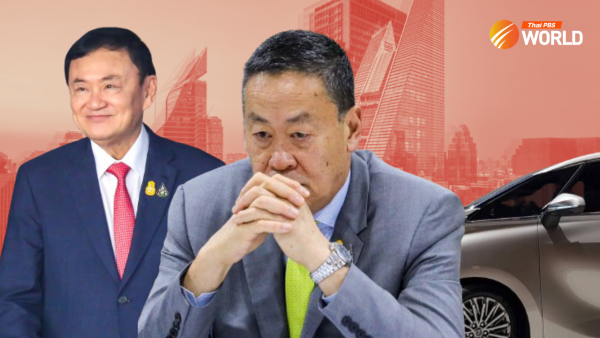Another storm brewing in Thailand as royalists riled by protesters’ ‘insolent’ letters to the King

In their boldest move so far, young anti-establishment protesters symbolically mailed letters to HM the King on Sunday night, calling for reform of the revered institution.
Royalists branded the letters as disrespectful and uncultured, while their direct form of address to highly-respected institution has sparked anger across conservative Thai society. Tensions are now running so high that observers are warning of possible violent clashes between royalists and anti-establishment protesters if the government fails to handle this issue properly.
Several thousand protesters marched from Bangkok’s Democracy Monument to the Royal Household Bureau inside the Grand Palace to deliver letters to His Majesty on Sunday. The letters called for the monarchy to be reformed, but also demanded the ouster of the Prayut Chan-o-cha government and a new, more democratic Constitution.
The peaceful march was marred briefly by police who used water cannon at Sanam Luang to stop protesters from approaching the Grand Palace.
Police later allowed them to place four red replica mailboxes near the Palace walls for the Royal Household Bureau to collect the following morning.
A declaration was read before protesters dropped their letters into the post boxes.
“If the King can talk to the people who love him, he must also talk to the people who do not all the same … The three demands made by the protesters are the utmost compromise,” the declaration read.
Sunday’s rally was called by Free Youth – one of the main protest groups.
“Let’s write a letter to King Vajiralongkorn,” Free Youth said in a Facebook invitation.
“One person, one letter. Let’s take this historical step together by communicating directly with our monarchy, so the institution is constrained within the constitution and democratic system.”
Authorities confiscated the red post boxes and letters, which are being kept at Chanasongkram Police Station. Police said they will study the letters and press charges if their content breaks the law.
Leaderless masses
Yuthaporn Issarachai, a political scientist from Sukhothai Thammathirat Open University, describes the protest movement as “leaderless mass politics” and expects protesters will now up the pressure by doubling down on their demands.
He voiced concerns of possible violent clashes between the anti-establishment crowd and royalists if the government fails to defuse the escalating tensions. A failure to intervene now could see the situation spiral out of control, he warned.
Paul Chambers, an international affairs professor at Naresuan University in Thailand, added: “By encouraging supporters to write directly to the King demanding monarchical reform – itself unprecedented – the pro-democracy camp are ratcheting up tensions with arch-royalists.
“It could spark violent retaliation,” he told the South China Morning Post.
Sharpening claws
The unprecedented demand to curb royal power has riled royalist groups, who have retaliated with counter-rallies.
Pressure is mounting on the government to find a way out of the crisis. PM Prayut Chan-o-cha has dismissed all demands, apart from agreeing to look into rewriting the Constitution, an issue scheduled to be tabled in Parliament on November 17.
Warong Dechgitvigrom, leader of conservative royalist group Thai Pakdee, which was created to counter the students’ push for reform, is calling on supporters to petition His Majesty to request the government use the severest laws to prosecute protesters.
“Is it time for us royalists to assemble again to submit a petition to the ‘Father of the Nation’ and demand that the government employ decrees like the lese majeste law to prosecute protesters?” Warong posted on his Facebook page on Monday, with the hashtags #DoYouThinkYouAreReady and #NoMoreTolerance.
The statement was in response to Sunday’s rally, which he said had distressed the entire nation and had been held despite the “King’s mercy” in asking that Article 112 (the lese majeste law) not be enforced since he loves all his people equally.
“But those [anti-establishment] protesters don’t appreciate this. They have been insolent and rude in the letters [submitted to the King],” he continued.
Royalists will gather as scheduled to display their loyalty by wearing yellow at a huge rally on December 5, the birthday of late King Rama IX, which is also marked as Father’s Day.
Paiboon Nititawan, deputy leader of the ruling Palang Pracharath Party, has gone one step further.
Slamming the protesters’ 10-point manifesto for monarchy reform as an attack on the royal institution, he called on royalists nationwide to file police complaints of sedition if they witness rallies demanding such reform. Protesters who were demanding reform are “enemies” of the royal institution, he added.
The sedition law (Article 116 of the Penal Code) carries punishment of up to seven years in jail for anyone found guilty of expressing opinions with the intention of inciting violence and unrest, to change the law or the government, or to encourage people to violate the law.
Another group led by ultra-royalist Krit Yiammethakorn on Monday submitted an open letter to PM Prayut, who is also defence minister, urging him to “shut down” the country by invoking special laws to end the political stalemate.
“I don’t mean [do it] with a coup, but the government, military and politicians must come out to tell them [protesters] to stop,” said Krit, secretary-general of the People’s Network for Protection of the Monarchy.
Nipit Intarasombat, deputy leader of the Democrat Party, meanwhile slammed the government for its “naivete” in handling the anti-establishment movement.
“The government is ignorant and has failed to take actions needed. As such, it has allowed the royal institution to be targeted. It’s like [the government] is implicitly becoming an ally in undermining the institution,” Nipit said in a Facebook post.
He added that the aggressive rallies and impudent letters to the King using impolite words were not a solution, but actually undermined the monarchy.
Only seeking change
Sunday’s march to the Grand Palace to address the monarchy directly is the boldest taken so far by the leaderless protest movement, and has sent shock waves reverberating through arch-royalist quarters.
Protesters have insisted all along that their intention is not to abolish the monarchy, but to make it compatible with Thailand’s constitutional monarchy system.
Under the lese majeste law, any criticism of the monarchy can result in a 15-year jail sentence, though Prayut has said the King has requested that nobody be prosecuted under the law for now.
The anti-establishment protesters’ calls for royal accountability began on September 20, when they marched to the Office of Privy Council to hand over an open letter listing their three demands, plus the 10-point manifesto on monarchy reform, to the King’s advisers.
The manifesto, which was first declared at a rally in August, calls for royal power to be curbed, the draconian lese majeste law to be scrapped, an end to the glorification of the Royal Family, a reduction in public funding of the monarchy, and the abolition of the Privy Council.
The letter was handed over to Bangkok police chief Pol Lt-General Pakkapong Pongpetra, who promised to deliver it to the council. So far, there has been no response to the demands from either the government or the Privy Council.
Last month, the protesters expanded their actions to the international stage – marching to the German Embassy in Bangkok and asking Germany’s government look into whether the King had exercised his sovereignty while in Bavaria.
His Majesty is known to spend a considerable amount of time each year in Germany – an issue that was recently raised in the German parliament.
However, a source there later told Reuters that Berlin does not believe the monarch has violated the ban on foreign leaders of state conducting state business while on its soil.
By Thai PBS World’s Political Desk






